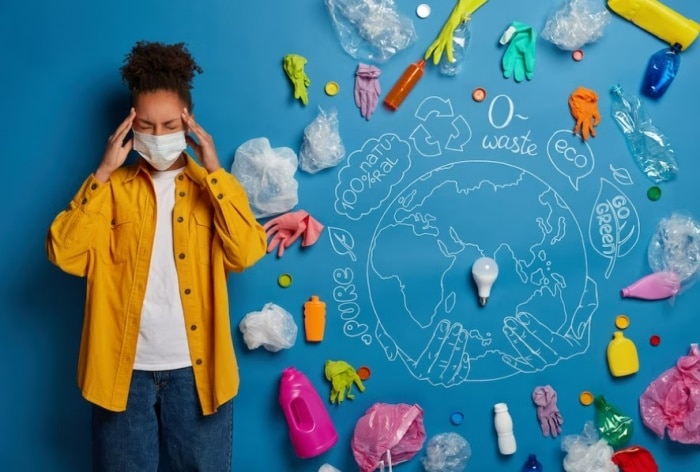Climate change is real and we can see but what we may miss is how it is deeply affecting not just our physical but mental health as well.

It is not uncommon to encounter terms, and conditions that one might have not heard before. There are several things like PMS, weight loss plateau, and mother’s guilt, that are health conditions that do exist but not people are aware of it or consider to be a real thing. But they do exist. One such thing is known as eco-anxiety. Just as the name suggests, it is anxiety pertaining to the environment we live in. It is not surprising that people are stressed out and gravely concerned about the environmental doom whose weight sits largely on our shoulders.
What is Eco – Anxiety?
According to the American Psychology Association (APA), “The chronic fear of environmental cataclysm that comes from observing the seemingly irrevocable impact of climate change and the associated concern for one’s future and that of next generations is called eco-anxiety.”
As published in The Opinion A 2020 survey of child psychiatrists in England published in The Opinion highlighted that more than half (57%) are seeing children and young people distressed about the climate crisis. A lurking fear of not being able to do anything for the degrading environment is a residing fear in the present generation.
Displaced people and forced migrants are among the groups of people who are most likely to suffer from Eco-anxiety. Taking into consideration the latest nature tragedy, the Turkey-Syria earthquake, millions were left homeless, and families lost, lost livelihoods. Everything down to shatters in a jiffy.
Mala Rao and Richard A Powell, of Imperial College London’s Department of Primary Care and Public Health say neglecting the effects of increasing eco-anxiety “risks exacerbating health and social inequalities between those more or less vulnerable to these psychological impacts,” while the socioeconomic effects — as yet hidden and unquantified — “will add considerably to the national costs of addressing the climate crisis.”
Albeit, Eco-anxiety is not listed in the Diagnostic and Statistical Manual of Mental Disorders, it is identified and used by mental health professionals in the field of Eco-psychology -’ a social and intellectual movement that strives to understand and harmonize people’s relationship with Earth.’
Eco-Anxiety Symptoms
From the curated list by the American Psychiatric Association, the changing climate affects mental health in the form of :
- Trauma and shock
- Aggression
- Reduced feelings of autonomy and control
- Feelings of helplessness
- Feeling fatalism
- Fear
- Existential Dread
In case of severe conditions, it may further lead to further problems like issues in sleeping, appetite changes, difficulty in concentration etc.
Eco-Anxiety in Youngsters
According to The Guardian, researchers offer insights into how young people’s emotions were linked with their feelings of betrayal and abandonment by governments and adults. Governments were seen as failing to respond adequately, leaving young people with “no future” and “humanity doomed.
It is now becoming perceptible that this alarming climate crisis is not limited to material changes. Along with physical, mental health is also being gravely affected specially in the younger generation. The
Frans Timmermans, European Commission’s Vice President, took to the floor of United Nations Climate Change Conference 2021- Conference of Parties (COP26) and worriedly said that “the sleep-deprived representatives of the 197 parties to the UN Framework Convention on Climate Change (UNFCCC) were about to stumble in the last couple of hundred metres before the finish line” and pleaded with his fellow-delegates “to just think about one person in your life…that will still be around in 2030, and think about how that person will live if we do not stick to the 1.5°C here today.”
Coping with Eco Anxiety
Some research has found that going for walks in nature (without technology) may be beneficial for people who have eco-anxiety or climate anxiety. Hobbies like gardening, planting trees and other similar activities could foster a sense of connectedness with the natural world. Meditating in nature could also be helpful.
Stay connected with us on social media platform for instant update click here to join our Twitter, & Facebook
We are now on Telegram. Click here to join our channel (@TechiUpdate) and stay updated with the latest Technology headlines.
For all the latest Lifestyle News Click Here
